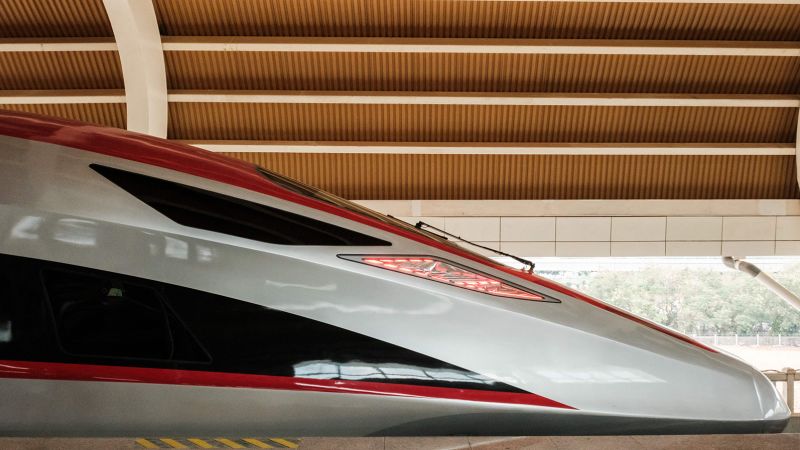Yasuyoshi Chiba/AFP/Getty Images
The first car of the Jakarta-Bandung high-speed train is seen on the platform during a week-long public trial phase at the Halim station in Jakarta on September 17, 2023.
CNN
—
Indonesia has launched Southeast Asia’s first-ever bullet train, a high-speed rail line that will connect two of its largest cities.
The $7.3 billion project, part of China’s Belt and Road infrastructure initiative and largely funded by Chinese state-owned firms, opened to the public on Monday following a series of delays and setbacks.
Originally scheduled for launch on October 1, a grand inauguration ceremony was held at the Halim railway station in the capital Jakarta on Monday, attended by President Joko Widodo and First Lady Iriana as well as several cabinet ministers.
“The Jakarta-Bandung high-speed train is the first high-speed train in Indonesia, and the first in Southeast Asia, with a speed of 350 kilometers per hour,” Widodo said to applause from the crowd, before sounding a red alarm to signal the beginning of official service.
“This is not without good teamwork from all parties, including the central government, local government, state-owned enterprises, private sectors and public as well as the Chinese government and its related companies – all working together to finish this project,” added Luhut Binsar Pandjaitan, Indonesia’s coordinating maritime and investment minister.
Videos taken on board and shared on social media showed off spacious air-conditioned cabin interiors and clear window views of the Indonesian countryside as the train sped off.
The new bullet train will travel between the Halim railway station in East Jakarta and West Bandung’s Padalarang railway station in West Java, Indonesia’s second-largest city and a major arts and culture hub.
The 86-mile (138-kilometer) high-speed rail line, officially named WHOOSH – which stands for “time saving, optimal operation, reliable system” in Indonesian – runs on electricity with no direct carbon emissions and travels at a speed of roughly 217 miles per hour – cutting travel time between Jakarta and Bandung from three hours to under less than an hour, officials say.
Overseen by the joint state venture PT Kereta Cepat Indonesia China (PT KCIC), the railway is well connected to local public transport systems. The trains, modified for Indonesia’s tropical climate, are equipped with a safety system that can respond to earthquakes, floods and other emergency conditions, officials added.
There are talks to extend the high-speed line to Surabaya – a major port and capital of East Java Province, PT KCIC director Dwiyana Slamet Riyadi told Chinese state media outlets at a ceremony earlier in September.
Stops at other major cities like Semarang and Yogyakarta, the gateway to Borobudur – the largest Buddhist temple in the world – are also being planned, Dwiyana said.
According to information released by PT KCIC, the railway features eight cars – all equipped with Wi-Fi and USB charging points – and seats 601 passengers.
There will be three classes of seats – first, second and VIP.
Yasuyoshi Chiba/AFP/Getty Images
Passengers sit at the Halim station in Jakarta.
Indonesia, the world’s fourth-largest country and Southeast Asia’s largest economy, has been actively and openly courting investment from China, its largest trade and investment partner.
A high-profile meeting in July between Indonesian and Chinese leaders Joko Widodo and Xi Jinping unveiled a series of projects, including plans to build a multi-billion dollar Chinese glass factory on the island of Rempang in Indonesia’s Riau Islands Archipelago as part of a new ‘Eco-City,’ sparking weeks of fierce protests from indigenous islanders opposed to their villages being torn down.
Akbar Nugroho Gumay/AP
Indonesia’s outgoing President Joko Widodo rides the high-speed railway during a test ride in Jakarta.
Widodo and Chinese Premier Li Qiang were photographed taking test rides on the new high-speed railway throughout September.
The train deal was first signed in 2015 as part of China’s Belt and Road Initiative and construction began later that year.
It was initially expected to be completed in 2019 but has faced multiple operational delays as a result of the Covid-19 pandemic as well as land procurement and ballooning costs.
PT KCIC’s director Dwiyana hailed the Jakarta-Bandung high-speed railway as an “outstanding example of bilateral cooperation between Indonesia and China.” It will not only improve Indonesian infrastructure but “promote the development of Indonesia’s railroad and manufacturing industries,” he said.
